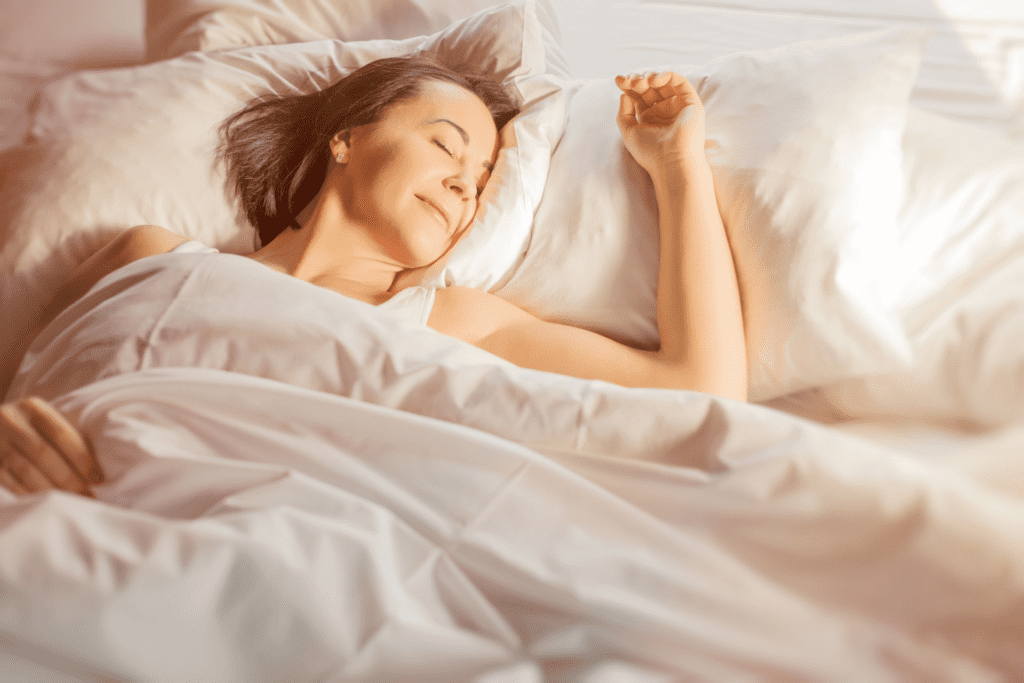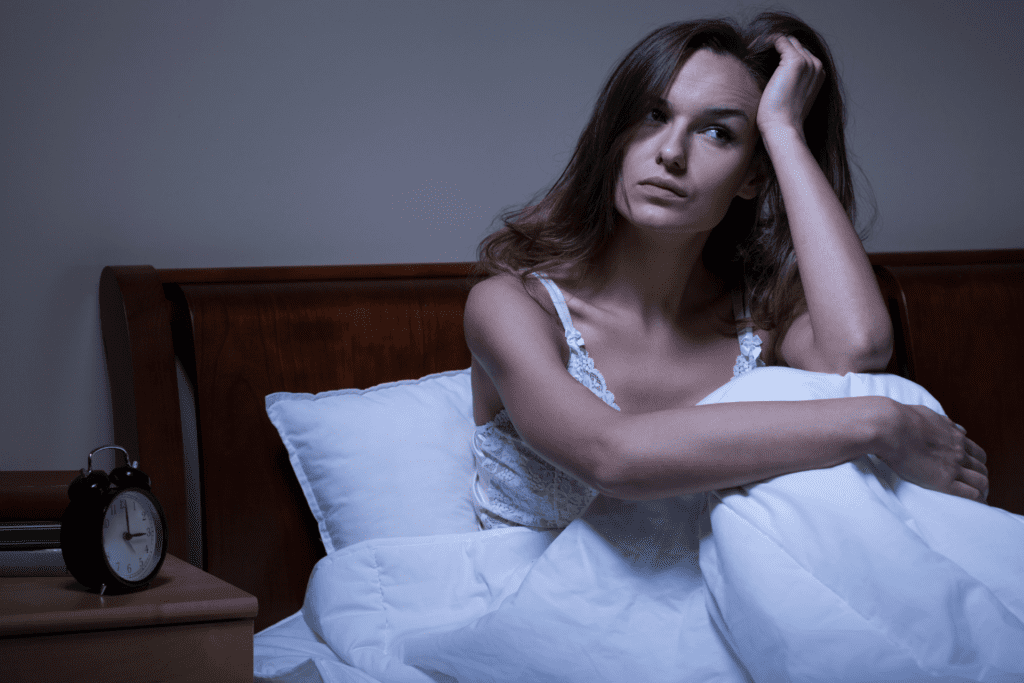Unlock better sleep for women over 50 with these tips. Discover the secrets to restful nights, rejuvenation, and wake up refreshed. Start sleeping better.

If you’re a woman over 50, paying particular attention to your sleep quality isn’t optional. Trust me when I say it’s been a game-changer for my overall health and well-being, and it can be for you too.
In this post, I’ll guide you through some of my favorite ways to optimize your beauty rest. We’re talking Huberman-level detail when it comes to getting your Zzzs.
Here’s everything you need to know about how to get better sleep for women over 50.
Why Do Sleep Patterns Change With Age?
I’ll be honest—I’m not one of those people who misses being young. When you age like fine wine, there’s not a whole lot to miss!
But if there’s one thing I actually miss about being a few decades younger, it’s the lost ability to click an easy 8 or 9 hours of sleep at night.
So why exactly do our sleep cycles change so much as we age?
I painstakingly researched the answer to this question. And I learned it goes beyond cutting off bright lights at the same regular times each night (although you should definitely do that!)
Let’s start with big M—menopause.
Menopause and sleep patterns
During the transformative phase of menopause, our bodies undergo significant hormonal changes. It’s no secret that these shifts can bring about a host of sleep issues, leaving you tossing and turning in frustration.

The decline in estrogen and progesterone levels disrupts the delicate balance of sleep-regulating hormones, wreaking havoc on your ability to maintain healthy sleep habits and achieve restful slumber.
Night sweats, hot flashes, and insomnia become unwelcome companions during the night, stealing away precious hours of rejuvenation and throwing you into a fitfully disturbed sleep.
Circadian rhythm shifts
Your body’s internal clock, known as the circadian rhythm, regulates sleep-wake cycles. With age, the circadian rhythm shifts, resulting in earlier bedtimes and wake-up times. This can lead to difficulty staying asleep through the night and waking up earlier than desired as people age.
Medical conditions
Age is often accompanied by an increased prevalence of various health conditions that can lead to poor sleep quality.
From chronic pain and arthritis to central sleep apnea and restless legs syndrome, the culprits are many. These conditions can cause discomfort, pain, and disruptions in breathing, leading to frustrating sleep difficulties and even chronic insomnia.
Medications and lifestyle factors
Certain medications commonly used by older adults can interfere with sleep. The effects of drugs for conditions related to heart failure and heart disease (like beta-blockers), thyroid regulation, and even blood pressure can throw you right off course.
Oh, and if you happen to live in a state where marijuana is legal, then know this—contrary to popular belief, THC does not help you fall asleep and stay asleep. In reality, marijuana can really mess with your sleep cycle.
Additionally, lifestyle factors such as increased stress, caffeine consumption, irregular sleep schedules, and insufficient physical activity can contribute to unwanted changes in sleep patterns.
High toxin load
In your pursuit of restful sleep, it’s essential to recognize the role that environmental toxins play in your sleep quality, particularly those lurking in your very own bedroom.
Harmful chemicals present in household items, such as mattresses, bedding, carpets, and cleaning products, can release toxins into the air you breathe as you sleep.
These toxins, including volatile organic compounds (VOCs) and formaldehyde, can harm our respiratory system and overall well-being. Inhaling these pollutants can lead to allergies, respiratory irritation, and even disrupt our sleep, leaving you feeling groggy and restless.
My Top 10 Tips On How To Get Better Sleep For Women Over 50
Okay, admittedly, it seems like there are a lot of things we can’t control going against us. But there are plenty of things we do have control over, and these tips are designed to help you make the most of each and every one.
One area often overlooked is your sleep environment, specifically, the mattress you rest on night after night.

Traditional mattresses may contain a myriad of toxic chemicals, such as flame retardants, volatile organic compounds (VOCs), and formaldehyde, which can off-gas and affect your respiratory system, hormonal balance, and overall health.
Nontoxic, organic mattresses are typically made with natural and organic materials, free from harmful chemicals, and crafted with eco-friendly production processes.
These mattresses provide a clean and healthy sleep surface, reducing the risk of allergies, respiratory irritations, and exposure to unnecessary toxins.
With a nontoxic mattress, you can rest assured that our sleep environment aligns with your commitment to a toxin-free lifestyle, fostering a deeper and more rejuvenating sleep experience.
Investing in a nontoxic mattress is an investment in your long-term health, allowing you to wake up refreshed, revitalized, and ready to embrace each new day.
- Stick to a consistent sleep schedule.
Establishing a consistent sleep schedule is one of the fundamental pillars of achieving better sleep for women over 50. Trust me, the impact of a regular sleep routine on your overall well-being is remarkable.
Going to bed and waking up at the same time each day creates a natural rhythm for your body, allowing it to regulate sleep patterns effectively.
So, take the time to set a bedtime that allows for adequate rest and stick to it, even on weekends.
Your body will thank you for the consistency, and you’ll notice a significant improvement in the quality of your sleep.
- Create a sleep sanctuary.
Creating a calm and comfortable atmosphere in your bedroom can work wonders for your sleep quality.
Consider factors such as temperature, lighting, and noise control to optimize your surroundings. Keep your bedroom cool, as a slightly lower temperature promotes better sleep.
Dim the lights or use blackout curtains to create a dark environment that supports melatonin production, the hormone responsible for regulating sleep.
Additionally, reduce noise disruptions with earplugs or a white noise machine, ensuring a peaceful and uninterrupted night’s rest.
- Ditch the caffeine and booze & optimize nutrition.
When it comes to better sleep for women over 50, paying attention to your dietary choices and limiting stimulants can significantly impact your sleep quality.
Caffeine, in particular, can have a stimulating effect that disrupts sleep patterns, so consider reducing or eliminating your intake, especially in the afternoon and evening.
Similarly, alcohol may initially make you feel drowsy, but it can disrupt the later stages of sleep, leading to fragmented rest.
Opting for a lighter meal in the evening and avoiding heavy, rich foods can also promote better sleep. Focus on incorporating sleep-friendly foods into your diet, such as cherries, almonds, and herbal teas known for their relaxing properties.
- Get your body moving.
Regular exercise is a powerful tool for improving sleep quality, especially for women over 50.
Engaging in physical activity not only benefits your overall health but also promotes better sleep patterns. Exercise helps reduce stress and anxiety, two common factors interfering with a good night’s rest.
Whether it’s brisk walking, swimming, yoga, or any other exercise that suits your preferences and abilities, aim for at least 30 minutes of moderate activity most days of the week.
But be mindful of timing your workouts. Exercising too close to bedtime may leave you feeling energized, making it harder to fall asleep. Instead, schedule your exercise sessions earlier in the day to allow your body enough time to wind down before bedtime.
- Manage stress and practice relaxation techniques.
You know those nights when you can’t seem to put an end to racing thoughts? That’s stress taking its toll on your sleep quality.

That’s why it’s essential to prioritize stress management and incorporate relaxation techniques into your daily routine.
Find activities that help you unwind and calm your mind, such as deep breathing exercises, meditation, or gentle yoga.
- Establish a bedtime ritual.
Establishing a bedtime ritual can significantly improve sleep for women over 50. A consistent pre-sleep routine signals to your body that it’s time to unwind and prepare for sleep.
Design a ritual that suits your preferences and helps you relax. This may involve activities such as taking a warm bath, reading a book, practicing gentle stretching or yoga, or engaging in a calming hobby.
The key is to choose activities that promote relaxation and create a sense of tranquility. Following a consistent bedtime ritual allows you to train your body to recognize the signals and transition into a more peaceful state, promoting easier and deeper sleep.
So, carve out a little time before bed to engage in activities that help you unwind and signal to your body that it’s time to rest.
- Avoid electronic devices before bed.
I know, I know—it’s just so much fun to scroll to your heart’s content until you drift off.

However, using electronic devices before bed can disrupt your sleep patterns and make it harder to fall asleep. The blue light emitted by screens can suppress melatonin production, the hormone that regulates sleep-wake cycles.
To promote better sleep, limit your exposure to electronic devices, such as smartphones, tablets, and computers, before bedtime. Instead, opt for activities that promote relaxation and prepare your mind for sleep.
Consider reading a book, practicing mindfulness or meditation, or engaging in a calming hobby.
- Seek medical advice for sleep disorders.
If you consistently experience difficulties with sleep despite implementing various strategies, it may be beneficial to seek medical advice for potential sleep disorders.
Women over 50 are more prone to certain sleep-related conditions, such as insomnia, sleep apnea, or restless legs syndrome.
Consulting with a healthcare professional, such as a sleep specialist or your primary care physician, can help identify and address any underlying sleep issues.
They can provide a proper diagnosis, recommend appropriate treatments, or refer you to a sleep clinic if necessary. So, if you suspect a sleep disorder may be affecting your sleep, don’t hesitate to seek medical advice and take the necessary steps toward better sleep.
- Practice good sleep hygiene.
Hygiene goes beyond brushing your teeth twice a day and giving yourself a good scrub down in the shower.
Sleep hygiene refers to adopting habits and behaviors that promote optimal sleep quality. So pretty much all the tips I offered in this article!
It encompasses various factors, including maintaining a comfortable sleep environment, avoiding stimulants, and establishing a consistent sleep routine.
Practicing relaxation techniques, managing stress, and engaging in regular exercise are also important components of good sleep hygiene.
Remember, consistency is key when it comes to practicing good sleep hygiene. By making these positive changes, you can enhance your sleep quality and wake up feeling refreshed and revitalized as a woman over 50.
Detoxify Your Sleep Habits, Detoxify Your Life
Don’t miss the chance to explore my nontoxic lifestyle guide, a comprehensive resource designed to support your journey toward a healthier and more rejuvenating existence.
It’s time to prioritize yourself and unlock the transformative benefits of better sleep—and an overall toxin-free lifestyle. Check out my Nontoxic Living 101 Guide to start living a nontoxic lifestyle so you can look great and feel even better.